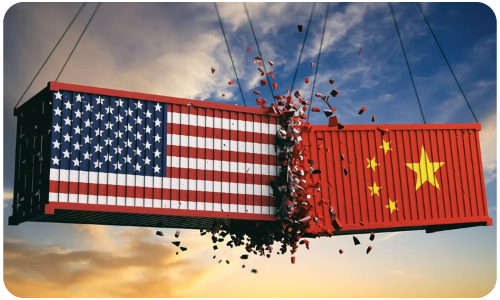
View previous months:
International Trade News for February 2025
🇺🇸 USA Tariff Update: Country of Origin – China

On 1st February 2025, the US government announced that it would impose tariffs on imports from Canada, Mexico and China, to be effective from 4th February 2025.
The impact of this change resulted in the removal of the Section 321 $800 USD de minimis threshold and the introduction of higher tariffs.
The US government subsequently reached agreements with Canada and Mexico on 3rd February and agreed to suspend the introduction of these tariffs for a period of 30 days.
On 7th February, the White House published a revision to allow for the temporary reinstatement of tariff-free treatment for packages below $800 from China, Macau and Hong Kong until “adequate systems are in place to fully and expediently process and collect tariff revenue”.
It is currently unclear how long the $800 de minimis threshold will remain for shipments containing goods where the Country of Origin is China, Macau or Hong Kong.
In response to the current market conditions, GFS has worked very closely with all our International Carrier partners to support DAP (Delivered at Place) and DTP (Duties & Taxes Paid) services into the United States for GFS customers.
UPCOMING INTERNATIONAL PUBLIC HOLIDAYS
We’ve put together a comprehensive list of upcoming public holidays in key international regions on our platform. Updated diligently every month, this resource ensures you stay informed so you can resolve any customer queries on parcel timings closer to public holidays in their region.
🌍 Supply Chain Shift – What’s Coming? (And the role of Friendshoring)

Recent developments have intensified discussions around the global supply chain’s evolution. Businesses are actively exploring alternative manufacturing hubs due to escalating trade tensions and geopolitical shifts. This raises several pertinent questions:
Which countries are emerging as viable alternatives to China for manufacturing?
Recent reports indicate that nations like Vietnam, India, Mexico, Thailand, Malaysia, Indonesia and the Philippines are becoming attractive manufacturing hubs as global supply chains are reshaped.
What challenges do these alternative hubs face?
While these countries are making strides, they might still rely to a large extent on importing components from China. For example, Chinese goods constitute a significant portion of Vietnam’s total consumption in various industries, indicating that a complete shift away from China’s supply chain dominance is complex.
Could North Korea realistically become a key player in the global supply chain?
Given its current economic isolation and the extensive international sanctions in place, integrating North Korea into the global manufacturing network presents significant challenges. The country’s limited infrastructure and ongoing sanctions make it a less viable option compared to other emerging hubs.
How are geopolitical dynamics influencing the relocation of manufacturing hubs?
Multiple geopolitical tensions are accelerating the diversification of supply chains. Companies are increasingly adopting a new strategy, moving production to Southeast Asia and Latin America to mitigate risks associated with over-reliance on Chinese manufacturing.
What role does “friendshoring” play in the current manufacturing landscape? “Friendshoring,” the practice of relocating supply chains to countries with shared political values or alliances, is gaining traction. This strategy aims to build resilient supply chains by partnering with politically aligned nations (for instance, semiconductor firms shifting operations to Southeast Asian countries like Malaysia). With growing tensions and trade restrictions, businesses are exploring alternative manufacturing hubs.

